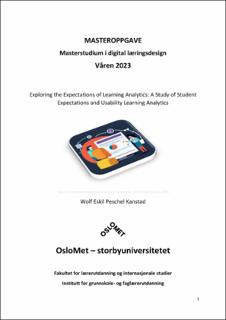| dc.description.abstract | In the field of Learning Analytics (LA), studies include LA methodology, techniques, tools, and its usability to stakeholders such as students, teachers, and institutions. However, to get a full understanding of how the full system functions, there is a need for more research from the students’ perspective as they use and produce the data and are the main stakeholders of LA. The overall aim of this thesis is to investigate and understand students’ expectations of LA, with an emphasis on their experiences with online learning environment. In the present instrumental case study four semi-structured interviews and one focus group interview (n=7) were conducted. Data were interpreted though a social constructive perspective and analyzed by using systematic text condensation, which established different themes used in the discussion. The Unified Theory of Acceptance and Use of Technology (UTAUT) model was applied to interpret the participants' perspectives and acceptance of LA and students experience with their relationship to different online learning environments. This allows in making assumptions on expectations and understanding how LA could be adapted to interactional and instructional design. Meeting students’ expectations is an important determinant in eventual acceptance of implementing LA services. In the analysis several themes found, some being “Quality of information”, “Use of personal data”, “Determined by Numbers”, and “LA, help or hindrance to learning?”. The study found that students’ experiences with online learning environments can help to understand expectations of new technologies such as LA. While most of the students believe that LA can have a positive impact, some also believe it can change their learning and education practices. Furthermore, they had privacy and ethical concerns of data gathering and use. However, those concerns would be less relevant if data was used to improve their learning outcome. | en_US |
